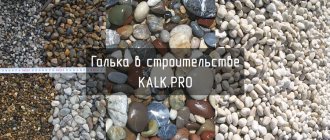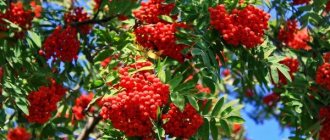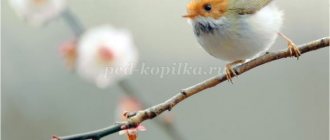Autumn
I. Sokolov-Mikitov
The chirping swallows flew south a long time ago, and even earlier, as if on cue, the swift swifts disappeared.
On autumn days, the children heard the passing cranes crowing in the sky as they said goodbye to their dear homeland. They looked after them for a long time with some special feeling, as if the cranes were taking summer with them.
Quietly talking, the geese flew to the warm south...
People are preparing for a cold winter. The rye and wheat were mowed long ago. We prepared feed for the livestock. The last apples are being picked from the orchards. They dug up potatoes, beets, and carrots and put them away for the winter.
The animals are also preparing for winter. The nimble squirrel accumulated nuts in the hollow and dried selected mushrooms. Little voles brought grains into the holes and prepared fragrant soft hay.
In late autumn, a hardworking hedgehog builds its winter lair. He dragged a whole heap of dry leaves under an old stump. You will sleep peacefully all winter under a warm blanket.
The autumn sun warms less and less often, more and more sparingly.
Soon, soon the first frosts will begin.
Mother Earth will freeze until spring. Everyone took from her everything she could give.
N. Sladkov “Autumn is on the threshold”
- Forest dwellers! - the wise Raven shouted one morning. — Autumn is at the threshold of the forest, is everyone ready for its arrival? Like an echo, voices came from the forest: “Ready, ready, ready...” “But we’ll check now!” - Raven croaked. - First of all, autumn will let the cold into the forest - what will you do? The animals responded: “We, squirrels, hares, foxes, will change into winter coats!” - We, badgers, raccoons, will hide in warm holes! - We, hedgehogs, bats, will fall into a deep sleep! The birds responded: “We, migratory birds, will fly away to warmer lands!” - We, settled ones, will put on down padded jackets! “Secondly,” the Raven shouts, “autumn will begin to rip off the leaves from the trees!” - Let him rip it off! - the birds responded. - The berries will be more visible! - Let him rip it off! - the animals responded. - It will be quieter in the forest! “The third thing,” the Raven continues, “autumn will click the last insects with frost!” The birds responded: “And we, blackbirds, will fall on the rowan tree!” - And we, woodpeckers, will begin to peel the cones! - And we, goldfinches, will get to the weeds! The animals responded: “And we will sleep more peacefully without mosquito flies!” “The fourth thing,” the Raven buzzes, “autumn will become boring!” He will catch up with dark clouds, let down tedious rains, and incite dreary winds. The day will be shortened, the sun will be hidden in your bosom! - Let him pester himself! - the birds and animals responded in unison. - You won’t keep us bored! What do we care about rain and winds when we are wearing fur coats and down jackets! Let's be well-fed - we won't get bored! The wise Raven wanted to ask something else, but he waved his wing and took off. He flies, and beneath him is a forest, multi-colored, motley - autumn. Autumn has already crossed the threshold. But it didn’t scare anyone at all.
Forest in autumn
I. Sokolov-Mikitov
The Russian forest is beautiful and sad in the early autumn days. Bright spots of red-yellow maples and aspens stand out against the golden background of yellowed foliage. Slowly circling in the air, light, weightless yellow leaves fall and fall from the birches. Thin silver threads of light cobwebs stretched from tree to tree. Late autumn flowers are still blooming.
The air is transparent and clean. The water in forest ditches and streams is clear. Every pebble at the bottom is visible.
Quiet in the autumn forest. Only fallen leaves rustle underfoot. Sometimes a hazel grouse whistles subtly. And this makes the silence even more audible.
It's easy to breathe in the autumn forest. And I don’t want to leave it for a long time. It’s good in the autumn flowery forest... But something sad, farewell is heard and seen in it.
G. Skrebitsky “Four Artists. Autumn"
For her work, the Autumn Artist took the brightest colors and first of all went into the forest with them. There she began to work on her painting. She covered the birches and maples with lemon yellow. And the aspen leaves turned red like ripe apples. The aspen tree became all bright red, all burning like fire.
Autumn wandered into a forest clearing. A hundred-year-old oak tree stands in the middle of a clearing, standing and shaking its thick leaves. Autumn thinks: “We need to dress the hero in bloody copper armor.” This is how I dressed the old man. He looks - and not far away, at the very edge of the clearing, thick, spreading linden trees have gathered in a circle, their branches lowered down. A heavy headdress made of gold brocade is most suitable for them.
Autumn decorated all the trees and even the bushes in its own way, in an autumnal way: some dressed in yellow, others in bright red. She only didn’t know how to decorate the pine and spruce trees. After all, they don’t have leaves on their branches, but needles, and you can’t paint them. Let them remain the same as they were in the summer. So the pines and spruce trees remained dark green in summer. And this made the forest even brighter, even more elegant in its colorful autumn attire.
Autumn went from the forest to the fields, to the meadows, removed the golden grain from the fields, and in the meadows swept the fragrant haystacks into stacks high, like towers. The fields and meadows became empty, even wider and more spacious. And schools of migratory birds stretched above them in the autumn sky: cranes, geese, ducks...
Autumn day in a birch grove
Author: Turgenev Ivan Sergeevich
I was sitting in a birch grove in the fall, around mid-September. From the very morning there was a light rain, replaced at times by warm sunshine; the weather was changeable. The sky was either covered with loose white clouds, then suddenly cleared in places for a moment, and then, from behind the parted clouds, azure appeared, clear and gentle...
I sat and looked around and listened. The leaves rustled slightly above my head; by their noise alone one could find out what time of year it was then. It was not the cheerful, laughing trembling of spring, not the soft whispering, not the long chatter of summer, not the timid and cold babbling of late autumn, but barely audible, drowsy chatter. A weak wind pulled slightly over the tops. The interior of the grove, wet from the rain, was constantly changing, depending on whether the sun was shining or covered with clouds; She then lit up all over, as if suddenly everything in her was smiling... then suddenly everything around her turned slightly blue again: the bright colors instantly faded... and stealthily, slyly, the smallest rain began to fall and whisper through the forest.
The foliage on the birches was still almost all green, although noticeably paler; only here and there stood one young girl, all red or all gold...
Not a single bird was heard: everyone took refuge and fell silent; only occasionally did the mocking voice of a tit ring like a steel bell.
***
An autumn, clear, slightly cold, frosty day in the morning, when a birch tree, like a fairy-tale tree, all golden, is beautifully drawn in the pale blue sky, when the low sun no longer warms, but shines brighter than a summer one, a small aspen grove sparkles through and through, as if it’s fun and easy to stand naked, the frost is still white at the bottom of the valleys, and the fresh wind gently stirs and drives away the fallen, warped leaves - when blue waves joyfully rush along the river, quietly lifting up the scattered geese and ducks; in the distance the mill knocks, half-hidden by willows, and, dappling the bright air, pigeons quickly circle above it...
***
Author: Kuprin Alexander Ivanovich
... By the beginning of September the weather suddenly changed dramatically and completely unexpectedly. Quiet and cloudless days immediately arrived, so clear, sunny and warm, which were not even in July. On the dried, compressed fields, on their prickly yellow stubble, an autumn cobweb glistened with a mica sheen. The calmed trees silently and obediently dropped their yellow leaves.
Autumn changes in nature for preschoolers
About Autumn for older preschoolers.
Autumn changes in nature Autumn is a time of joy and happiness, feeling a surge of energy and strength, and for some it is a time of hope and search for the meaning of life. Autumn is a mysterious time of year, captivating with the beauty of falling leaves, gentle singing of birds and magical natural landscapes. How wonderful it is to walk leisurely through the park on a quiet, sunny autumn day, kicking up bright scatterings of leaves, wander through the forest, inhaling fresh air and enjoying the unearthly beauty of nature in a wonderful and mysterious time of year - autumn. Autumn is a period of important changes in living and inanimate nature. Changing weather conditions and temperatures affect trees, plants, birds and animals. What phenomena occur in autumn and how does this affect the world around us? What changes occur in wildlife in autumn? Autumn is the period of transition from summer activity to the processes of winter stagnation. Autumn is characterized by the following changes in wildlife: - yellowing and falling leaves;
- wilting of herbaceous plants; — preparing animals for winter (collecting and storing supplies, growing fur); departure of migratory birds; - disappearance of insects. Let's look at these natural phenomena in more detail.
Yellowing and falling leaves. The first sign of autumn is the change in color of the leaves on the trees. This natural phenomenon is associated with biological changes that occur in most trees during the onset of the first cold weather.
Why do leaves on trees change color? As Georgy Graubin explains in his book “Why Leaves Fall in Autumn?”, the green color is given to them by a special substance - chlorophyll. With the onset of autumn, the sun shines less, the days become shorter, and plants receive less light. Under such conditions, chlorophyll is destroyed and does not have time to be restored. The green color in the foliage decreases and yellow becomes noticeable. In autumn, the leaves can be yellow, red, or crimson. It depends on what coloring matter is in the leaf. After the color changes in the last months of autumn, the leaves begin to fall from the trees.
This is of great physiological importance for them: the plants get the opportunity to rest and prepare for hibernation; the risk of mechanical damage is reduced - without leaves, a lot of snow does not accumulate on the branches during snowfalls; Together with the leaves, the plants shed pests that lived on them in the summer.
Wilting of herbs In autumn, herbs part with the above-ground part of the plant in order to save the more important parts - rhizome, tuber or bulb.
Nutrients accumulate in the underground structural elements of grasses over the summer, which perform two important functions: they prevent the plant from dying during the cold period; retain the ability to quickly revive the stem and leaves with the arrival of spring. Some animals hibernate.
Hibernation is a special state of plants and animals, when during periods of cold weather and lack of food, the activity and vital functions of the body decrease, the exchange of juices and the need for food decreases. Who hibernates when autumn arrives? Here are several types: Some mammals (bear, hedgehog, badger, marmot), rodents (hamster, gopher). They hibernate at the end of autumn - at the beginning of winter, which is due to the lack of food supply for them. Cold-blooded animals (snakes, frogs), reptiles and amphibians. They "fall asleep" in late autumn because they cannot maintain the temperature necessary to survive. Insects - flies, mosquitoes, beetles, spiders. With the onset of cold weather, they hide in cozy crevices and appear dead. This is a protective reaction to a decrease in temperature. With the onset of spring they will come to life.
We recommend watching:
Autumn phenomena in nature Didactic materials on the topic: Autumn for kindergarten Poems on autumn themes for children 5-7 years old Autumn riddles for children 4-5 years old in kindergarten with answers
Similar articles:
Outdoor games for a walk in the younger group in the fall
Poems about autumn for children 4-5 years old in kindergarten
Signs of September for children
Signs of October for children
Signs of November for children
Late fall
Korolenko Vladimir Galaktionovich
Late autumn is coming. The fruit has become heavy; he breaks down and falls to the ground. He dies, but the seed lives in him, and in this seed lives in “possibility” the entire future plant, with its future luxurious foliage and its new fruit. The seed will fall to the ground; and the cold sun is already rising low above the earth, a cold wind is running, cold clouds are rushing... Not only passion, but life itself freezes quietly, imperceptibly... The earth increasingly appears from under the greenery with its blackness, cold tones dominate the sky... And then it comes the day when millions of snowflakes fall on this resigned and quiet, as if widowed earth, and it all becomes smooth, monochromatic and white... White is the color of cold snow, the color of the highest clouds that float in the unattainable cold of the celestial heights - the color of majestic and barren mountain peaks...
Choose an action
Leaves in the fall (what do they do?) - turn yellow, fall off, etc. Rain in the fall - drizzling, falling, etc. The harvest is harvested in the fall. Birds fly away in the fall. Trees in autumn shed leaves. Leaves in autumn (what?) - yellow, red, crimson, gold. How can you say this in one word? (Multi-colored.) Rain in autumn (what kind?) - cold, drizzling. The weather in autumn (what?) - cloudy, rainy, gloomy, frosty (late autumn). Trees in autumn (which ones?) - early - with multi-colored leaves, late - bare. Animals in the fall are preparing for winter, changing their coats. fox, squirrel, ermine, hare (does not change color); squirrel, vole, hare, badger (does not store).
Find out what else a child at this age should know and be able to do.
- Children from 4 years to 5 years
The best gifts you need:
|
Antonov apples
Bunin Ivan Alekseevich
I remember an early fine autumn. August had warm rains at the right time, in the middle of the month. I remember an early, fresh, quiet morning... I remember a large, all golden, dried up and thinning garden, I remember maple alleys, the subtle aroma of fallen leaves and the smell of Antonov apples, the smell of honey and autumn freshness. The air is so clean, it’s as if there is none at all. There is a strong smell of apples everywhere.
By night it becomes very cold and dewy. Having inhaled the rye aroma of new straw and chaff on the threshing floor, you cheerfully walk home for dinner past the garden rampart. Voices in the village or the creaking of gates can be heard unusually clearly in the chilly dawn. It's getting dark. And here’s another smell: there’s a fire in the garden and there’s a strong wafting of fragrant smoke from cherry branches. In the darkness, in the depths of the garden, there is a fabulous picture: as if in a corner of hell, a crimson flame, surrounded by darkness, is burning near a hut...
“Vigorous Antonovka - for a fun year.” Village affairs are good if the Antonovka crop is bad: that means the grain is bad too... I remember a fruitful year.
At early dawn, when the roosters were still crowing, you would open a window into a cool garden filled with a purple fog, through which the morning sun shines brightly here and there... You would run to wash your face at the pond. Almost all the small foliage has flown off the coastal vines, and the branches show through in the turquoise sky. The water under the vines became clear, icy, and seemingly heavy. It instantly drives away nighttime laziness.
You enter the house and first of all you will hear the smell of apples, and then others.
Since the end of September, our gardens and threshing floors have been empty, and the weather, as usual, has changed dramatically. The wind tore and tore the trees for days on end, and the rains watered them from morning to night.
The liquid blue sky shone coldly and brightly in the north above the heavy lead clouds, and from behind these clouds the ridges of snowy mountains-clouds slowly floated out, the window into the blue sky closed, and the garden became deserted and boring, and the rain began to fall again... at first quietly , carefully, then more and more thickly and finally turned into a downpour with storm and darkness. A long, anxious night was coming...
From such a scolding the garden emerged completely naked, covered with wet leaves and somehow quiet and resigned. But how beautiful it was when clear weather came again, clear and cold days of early October, the farewell holiday of autumn! The preserved foliage will now hang on the trees until the first frost. The black garden will shine through the cold turquoise sky and dutifully wait for winter, warming itself in the sunshine. And the fields are already turning sharply black with arable land and brightly green with bushy winter crops...
You wake up and lie in bed for a long time. There is silence throughout the whole house. Ahead lies a whole day of peace in the already silent winter estate. Slowly get dressed, wander around the garden, find a cold and wet apple accidentally forgotten in the wet leaves, and for some reason it will seem unusually tasty, not at all like the others.
Mysteries of Autumn
*** Gold coins are hanging on a branch. (Autumn leaves) *** In the morning we go into the yard - The leaves are falling like rain, rustling under our feet And flying, flying, flying... (leaf fall) *** I came without paints and without a brush And repainted all the leaves. (Autumn) *** She brings us the harvest, Reseeds the fields, Sends the birds to the south, She covers the trees, But she doesn’t touch the spruces and pines, Because it.. (Autumn) *** Who is this gardener? I watered the cherries and gooseberries, I watered the plums and flowers, I washed the herbs and leaves. And when dusk came, they told us on the radio that tomorrow he would come and water our garden. (Rain)
Dictionary of native nature
Paustovsky Konstantin Georgievich
It is impossible to list the signs of all seasons. Therefore, I skip summer and move on to autumn, to its first days, when “September” already begins.
The earth is withering, but the “Indian summer” is still ahead with its last bright, but already cold, like the shine of mica, radiance of the sun. From the thick blue of the sky, washed with cool air. With a flying web (“the yarn of the Virgin Mary,” as earnest old women still call it in some places) and a fallen, withered leaf covering the empty waters. Birch groves stand like crowds of beautiful girls in shawls embroidered with gold leaf. “A sad time is a charm of the eyes.”
Then - bad weather, heavy rains, the icy northern wind "Siverko" plowing through the leaden waters, cold, coldness, pitch-black nights, icy dew, dark dawns.
So everything goes on until the first frost grabs and binds the earth, the first powder falls and the first path is established. And there is already winter with blizzards, blizzards, drifting snow, snowfall, gray frosts, poles in the fields, creaking cuts on the sledges, a gray, snowy sky...
***
Often in the fall I closely watched the falling leaves in order to catch that imperceptible split second when the leaf separates from the branch and begins to fall to the ground, but for a long time I was not able to do this. I've read in old books about the sound of falling leaves, but I've never heard that sound. If the leaves rustled, it was only on the ground, under a person’s feet. The rustle of leaves in the air seemed as implausible to me as stories about hearing grass sprouting in the spring.
I was, of course, wrong. Time was needed so that the ear, dulled by the grinding of city streets, could rest and catch the very pure and precise sounds of the autumn land.
One late evening I went out into the garden to the well. I placed a dim kerosene bat lantern on the frame and took out some water. Leaves were floating in the bucket. They were everywhere. There was no way to get rid of them anywhere. Brown bread from the bakery was brought with wet leaves stuck to it. The wind threw handfuls of leaves on the table, on the bed, on the floor. on books, and it was difficult to groom along the paths of tallow: you had to walk on the leaves, as if through deep snow. We found leaves in the pockets of our raincoats, in our caps, in our hair—everywhere. We slept on them and were thoroughly saturated with their smell.
There are autumn nights, deaf and silent, when there is no wind over the black wooded edge and only the watchman's beater can be heard from the village outskirts.
It was such a night. The lantern illuminated the well, the old maple under the fence and the nasturtium bush tousled by the wind in the yellowed flowerbed.
I looked at the maple and saw how a red leaf carefully and slowly separated from the branch, shuddered, stopped in the air for an instant and began to fall obliquely at my feet, slightly rustling and swaying. For the first time I heard the rustling of a falling leaf - a vague sound, like a child’s whisper.
November: welcoming winter
Description of the nature of late autumn November (III - IV week)
Winter is getting closer and closer. The clouds are solid and gray, there is a foggy haze in the air, and in the morning the puddles are covered with crusts of ice. By the end of the month, the ponds freeze, covering them with completely flat ice. The average air temperature in October is 2-3 degrees below zero Celsius. Outwardly, November is a gray and sad month; only the last week of November can turn into white, freshly fallen snow, which will finally settle firmly on the soil and tree branches.
The water temperature is decreasing and many fish are already burrowing into the mud; catfish, crucian carp, and carp spend the winter in hibernation. During the winter, many floating fish remain in the rivers: perch, ruffe, and pike. By the end of the month, the thermometer has already dropped firmly below zero; all that remains is for snow to fall before winter begins.
And then, suddenly, as they say, snow falls on your head. In a matter of moments, it covers fields, river banks and trees with a white blanket. Everything is shrouded in snow, as if it is becoming warmer and happier from the white flakes slowly falling from the sky. Winter comes slowly and imprisons nature in icy shackles.
The second half of November in the folk calendar
"Fedor Studit - chills the earth"
The people greet winter with fun and holidays - November 14 is Kuzma-Demyan Day, also called Kuzminki. Now the rays of the sun are not able to warm. And from the very next day - November 15, Akundin Day, they began to work around the house. The girls wove, spun, and embroidered, and the men ground bread. By November 19th, winter froze up and bound the ponds and rivers with ice, but already on November 20th - Fedot, they talked about it - on this day the ice rises upon the ice.
Winter inhaled the cold, and suddenly, as if it had stumbled, took a step back - the Mikhailovsky thaw thundered on November 21. The snow that has managed to gain a foothold on the ground is melting, and the roads are dirty and slippery. But this is not for long, Matryona arrives on November 22 and winter shows its strength with might and main, frosts set in. November 25 Fyodor Studit. Those in the know said that if it rains on this day, then there will be a long thaw with mud snow underfoot, and if the snow lies firmly, then the winter will be long and snowy. By November 29, winter is already firmly on its feet, and the time for snowstorms and intensifying frosts is approaching. Winter enters Rus' on a sleigh.
Autumn in Russian painting
The slight sadness of late autumn can be seen in Alexander Stepanov’s landscape “Autumn”: colorless sky, bare branches, faded withered grass. The proximity of winter, loneliness and inevitability - these are the feelings that the work evokes.
(Painting by Efim Volkov “Swamp in Autumn”)
In Efim Volkov’s landscape “Swamp in Autumn” the sky is also an indeterminate gray color, but the mood is completely different. Maybe because there are also images of people and human habitation, which gives life to the picture, makes it life-affirming.
See: Paintings by Russian artists about autumn
My house
Paustovsky Konstantin Georgievich
It’s especially good in the gazebo on quiet autumn nights, when the slow, sheer rain is making a low noise in the sala.
The cool air barely moves the candle tongue. Corner shadows from grape leaves lie on the ceiling of the gazebo. A moth, looking like a lump of gray raw silk, lands on an open book and leaves the finest shiny dust on the page. It smells like rain - a gentle and at the same time pungent smell of moisture, damp garden paths.
At dawn I wake up. The fog rustles in the garden. Leaves are falling in the fog. I pull a bucket of water out of the well. A frog jumps out of the bucket. I douse myself with well water and listen to the shepherd’s horn - he is still singing far away, right at the outskirts.
It's getting light. I take the oars and go to the river. I'm sailing in the fog. The East is turning pink. The smell of smoke from rural stoves can no longer be heard. All that remains is the silence of the water and the thickets of centuries-old willows.
Ahead is a deserted September day. Ahead - lost in this huge world of fragrant foliage, grass, autumn withering, calm waters, clouds, low sky. And I always feel this confusion as happiness.





